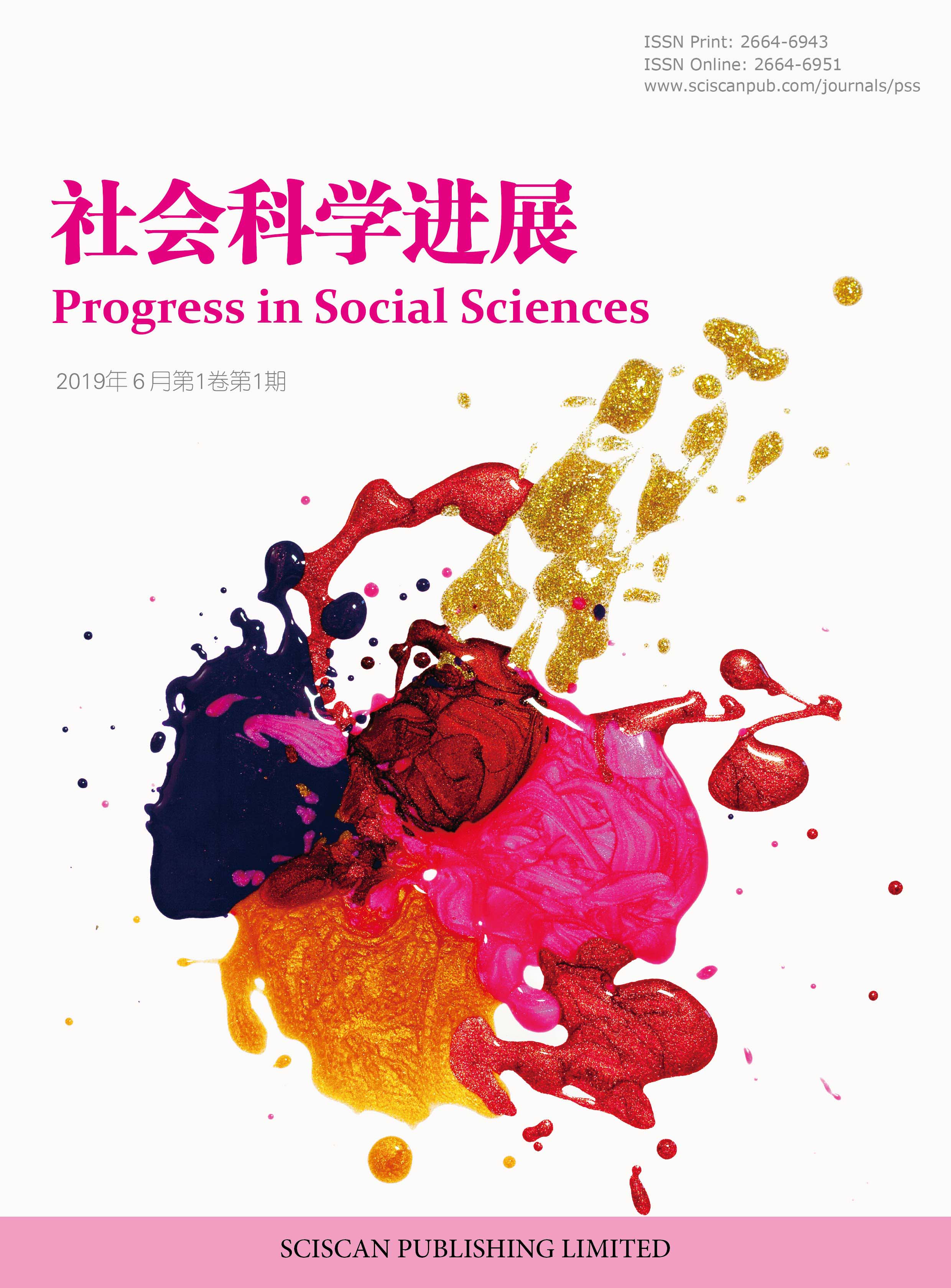Progress in Social Sciences
人称代词的翻译 ——以《自由绽放:年长女性的多彩人生》部分选段为案例
Translating Personal Pronouns in an English- Chinese Corpus —Case Study of A Glorious Freedom: Older Women Leading Extraordinary Lives
- Authors: 王歆妍
-
Information:
上海外国语大学贤达经济人文学院,上海
-
Keywords:
Personal pronouns; Translation methods; Corpus人称代词; 翻译方法; 语料库
- Abstract: Personal pronouns play an important role in the overall cohesion and coherence of the text. If the personal pronouns are not correctly translated,the target text will be hard for readers to follow, the original style and tonewill also be lost during the translation process. The systematic differences ofpersonal pronouns in English and Chinese are essentially: English and Chinesebelong to different language systems. English is a highly formalized languagewhile Chinese is focusing more on the expression. Furthermore, explicitaionhas been a hot spot in translation world. Many scholars have conducted studiesin this area. This paper focus on the translations of personal pronouns fromEnglish into Chinese, dividing English-to-Chinese conversion types of personalpronouns into three: correspondence, explicitation and implicitness( omission).Based on a self-built small English-to-Chinese parallel corpus, analyzing thestatistics of the translation of personal pronouns. The results show that the texttypes has little effect on the translation of personal pronouns. The translationmethod used in this corpus is mainly correspondence, followed by implicitness,then explicitation. Therefore, the translation of personal pronouns can use thecorresponding method, but it should also be combined with the specific analysisof the context to achieve the purpose of rationality and coherence. 人称代词对文章的整体凝聚力和连贯性起着重要作用。如果人称代词翻译不当,目标文本就会让读者难以理解,原文的风格和语气也会在翻译过程中丢失。英汉人称代词的系统差异主要体现在以下几个方面:英语和汉语属于不同的语言系统。英语是一种高度形式化的语言,而汉语则更注重表达。此外,表意性一直是翻译界的热点。许多学者在这方面进行了研究。本文以人称代词的英译汉为研究对象,将人称代词的英译汉转换类型分为三种:对应、显化和隐化(省略)。基于自建的小型英汉平行语料库,对人称代词的翻译进行统计分析。结果表明,文本类型对人称代词的翻译影响不大。该语料库采用的翻译方法主要是对应,其次是隐化,然后是显化。因此,人称代词的翻译可以采用对应法,但也要结合语境具体分析,达到合理、连贯的目的。
- DOI: https://doi.org/10.35534/pss.0602040
- Cite: 王歆妍.人称代词的翻译——以《自由绽放:年长女性的多彩人生》部分选段为案例[J].社会科学进展,2024,6(2):502-511.
文化差异决定了中英文话语表述的不同。英语和汉语分属两个不同的语系:英语和汉语分别属于汉藏语系和印欧语系,因此在语言形式和表达方式上存在明显差异(Fan,2003 )。英语是一种形式化语言,注重句子的结构和整体性,而汉语则不注重形式,而注重表达和内聚力。这就需要在翻译过程中使用显性或隐性的方法使译文更加地道。翻译是一个包含两种不同语言的交际过程,在这个过程中会出现翻译特征,阐释就是其中之一(Ke,2005)。
人称代词在话语的凝聚力、连贯性和交流中发挥着重要作用。结合阐释和人称代词的研究,本文将说明:(1)研究自建英汉平行语料库来描述人称代词的翻译;(2)译者在翻译人称代词时应使用什么样的方法。
1 文献综述
人称代词在话语的凝聚力、连贯性和交流中发挥着重要作用。《柯林斯英语词典》(2020 年)对“人称代词”的定义如下:A personal pronoun is a pronoun such as‘I’,‘you’,‘she’,or‘they’which is used to refer to the speaker or the person spoken to, or to a person or thing whose identity is clear, usually because they have already been mentioned.人称代词在分句中用作主语、宾语或补语。当名词短语被第二次提及时,人称代词通常会代替名词短语。
许多中国学者对汉语和英语的人称代词进行了对比研究。去掉人称代词是汉语句子的一大特点。相反,英语则非常依赖人称代词。学者赵世凯(1996)对英汉翻译中的人称代词进行了研究,得出以下结论:第一,英语中第三人称代词的使用量远高于汉语;第二,英语中第三人称单数的使用量远低于汉语;第三,在第二人称代词的使用上,汉语中第二人称代词的使用量多于英语。在英译汉的过程中,第一人称代词的翻译量减少,而第二人称代词的翻译量增加。这一研究为后续的英汉翻译工作提供了基本指导。
从第三人称代词作为指称手段的角度来看,王琼和王克非(2004)发现,在学生的英汉翻译练习中,与他们的母语写作相比,会出现第三人称代词的冗余。何颖(2018)对英汉两种语料中人称代词的使用进行了研究,结果表明无论是文学类文本还是非文学类文本,人称代词的英译汉和汉译英都有增加的趋势。魏黎, 刘小蓉(2016)将英译汉人称代词翻译分为三种转换类型:对应、省略和替换。而这三种转换的频率依次降低。他们建议在翻译人称代词时采用不同的翻译方法,尤其是省略和替换,以达到使译文接近母语的目的。
学者黄立波(2008)基于双语平行语料库对文学作品和非文学作品中人称代词的翻译进行了研究,结果表明在英译汉语料库中,无论是文学作品还是非文学作品,翻译作品中人称代词的数量和频率都有减少的趋势;人称代词的转换主要表现为对应,而很少应用显化和隐化。
任晓华(2015)选取译入语和源语的可比语料对人称代词的翻译进行研究。总体而言,人称代词的翻译在汉语中表现明显,尤其是第三人称代词的翻译比第一人称代词和第二人称代词都要多;文本类型对人称代词的释义几乎没有影响。
2 研究方法
20 世纪 60 年代以来,语料库和语料库语言学蓬勃发展,为语言学研究注入了新的活力,并迅速应用于第二语言习得、语义学、比较语言学、翻译和词典编纂等各个研究领域。随着各种研究的深入,世界上已经建立了各种类型的语料库。 本研究使用的语料库指的是自建的英汉平行语料库。
本次研究的案例为自传和访谈类型的书籍。自传的特点不同于其他类型的文本(政治文本、商业文本、科学文本等),自传通常以第一人称写作,作者用主客观细节和趣闻轶事讲述自己的人生故事。本文选取了该书中的三篇访谈和两篇自传,利用这些数据建立了一个小型的英汉平行语料库来进行研究,旨在研究这两种文本中人称代词的翻译以及译者使用了何种翻译方法。详细信息如表1所示。
表1 可比英语翻译语料库中的词数
Table 1 Running words in comparable corpora of translated English
|
文本类型 |
字数 |
原文(英语) |
译文(汉语) |
|
自传 |
24,229 |
4,198 |
7,195 |
|
采访 |
27,556 |
5,187 |
7,923 |
结果表明,中文译文字数多于英文源文本。事实上,西方研究者早在 20 世纪 60 年代就已经注意到这一现象,即在翻译过程中,目标文本比源文本长,因为为了使译文具有可读性和连贯性,译者会在明确的源文本中添加连接词和其他部分(何先彬,2003 )。
表2显示了人称代词的划分,所有人称代词分为三类:第一人称代词、第二人称代词和第三人称代词。
表2 人称代词和翻译
Table 2 Personal pronouns and Chinese translation
|
Ⅰ |
Ⅱ |
Ⅲ |
|
我(I/me) |
你(you) |
他/他的(he/him/his) |
|
我们 |
你们 |
她/她的(she/her/hers) |
|
我的(我的/我的) |
你的(your/yours) |
它/它的(it/its) |
|
我们的(我们的/我们的) |
你们的(your/yours) |
他们(的)/她们(的)/它们(的)(they/them/theirs) |
3 结论
3.1 人称代词的转换类型
在英汉翻译中,人称代词主语的转换类型可分为四种:对应、显化、增译和省译(黄立波,2008)。其中,由于显化和增译之间的界限有时比较模糊,增译可归为显化。省略是隐化的一个子类别,因此,本文主要研究人称代词的三种翻译类型:对应、显化和隐化。
对应策略是指将原文中的人称代词直接翻译成目的语中相对应的汉语人称代词。这也是人称代词翻译中最常见的形式。例如:
(1)you’re not going to go out with us and play flip cup or beer pong, because you don’t do that。
你应该不会和我们一起去酒吧玩抛杯子、投杯球吧,你这个年纪应该不做这些事了。
However, I wouldn’t mind another cup of coffee.
但现在,我真的更需要一杯咖啡来提提神儿了。
以上例子表明,人称代词可以选择直译的翻译方法,因为在该语境中不存在其他隐含意义。采取对应的翻译方法并不会造成对文章意义的歧义或误解。
人称代词的显化是指在翻译过程中明确表达或补充出源文本中的隐含意义或内容。显化的翻译策略可能包括两种情况:还原和替换(Zhang 2017)。还原方法适用于人称代词指代特定事物的情况,此时译文需要将指代意义明确化。 请看如下例子:
(2)“I can’t say it’s going to be easy, but go for it,” they said.
“我不能保证你选的路会很容易地走下去,但加油!挺你哦。”
这篇故事的作者在 53 岁时选择辞职,去医学院进修学习,从而追逐自己幼时渴望成为教师的梦想。她的朋友和同事们给她发邮件道别并鼓励她。该语境下的“它”特指她放弃安逸的生活,重新成为一名学生的选择。将“它”翻译成“你选的路”,明确了人称代词的指代意义,使读者能够紧扣语境,所以使用显化的翻译方法使译文更加清晰易懂。
(3) It’s like I took a leap off a cliff, and the free fall is exhilarating, and not knowing where you’re landing is terrifying—no matter how hard it’s been, no matter what the challenge is.
就像从悬崖边上一跃而下,自由落体的时候又刺激又兴奋,但不知道小命能不能保住又让我胆战心惊,毕竟无论什么样的挑战,简单还是艰难,你可都得接受。
替换的翻译方法是根据上下文确定此处人称代词的真正含义,并用另一个合适的词来代替原词。在这个例子中,作者一直以来会染发来隐藏自己的白发,不敢将自己的白发袒露在大众的视野中,担心别人的闲言碎语,但最终决定接受自己本来的样子,向大众展示自己的白发且不以为耻,这种激动人心的感情都是属于作者的,所以当她用“你”的时候其实指的是她自己。所以此处翻译成“我”而不是原文中的“你”要更加合适,使读者明确动作的主体。
(4)I am 49 years old. I have a 7-year-old daughter and a just-turned 2-year-old son.
我如今49岁,大女儿7岁,小儿子刚两岁。
上面的例子说明了翻译人称代词可以采用隐化(省略)的翻译策略。由于英文结构重形合,强调语法,重视句子结构的完整性,所以英文原文中包含了多个人称代词以达到该目的。但在重意合的中文语境中,并不强调句子各个成分的完整,几个短句可以共用一个人称代词,读者同样可以理解到位,这体现了中英文语言特点的差异和表达习惯的不同。如果把所有的人称代词“我”都翻译成 “我”,译文就会变成 “我很绝望,我被击垮了,我羞愤难当”,既冗余又不符合汉语表达习惯。隐化使译文简洁,不丢失任何信息。
3.2 统计与分析
在建立小型英汉平行语料库之后,作者进行了统计分析。首先,将所有人称代词分为三种类型:第一人称代词、第二人称代词和第三人称代词。然后使用 Wordsmith 4.0 的 Concord 功能进行统计,还需要人工验证。表3和表4中的结果显示了英语人称代词翻译成汉语的三种不同类型,此外,每个表格还显示了一种文本类型。
表3 采访文本中人称代词的转换
Table 3 Conversion of personal pronouns in interview text
|
类型 |
总计 |
对应 |
显化 |
隐化 |
||||
|
人称代词 |
Ⅰ |
331 |
276 |
83.4% |
16 |
4.8% |
39 |
11.8% |
|
Ⅱ |
115 |
103 |
89.6% |
4 |
3.5% |
8 |
6.9% |
|
|
Ⅲ |
113 |
45 |
39.8% |
27 |
23.9% |
41 |
36.3% |
|
表 4 自传文本中人称代词的转换
Table 4 Conversion of personal pronouns in autobiography text
|
类型 |
总计 |
对应 |
显化 |
隐化 |
||||
|
人称代词 |
Ⅰ |
183 |
147 |
80.3% |
8 |
4.4% |
28 |
15.3% |
|
Ⅱ |
24 |
16 |
66.7% |
2 |
8.3% |
6 |
25% |
|
|
Ⅲ |
72 |
50 |
69.4% |
9 |
12.5% |
13 |
18.1% |
|
统计结果表明,无论是访谈类文本还是自传类文本,英语人称代词汉译时的主要转换方式都是对应转换。其次是隐化,在人称代词的翻译中也会出现显化,但没有其他转换类型发生得多。这背后的原因主要与语言差异有关,也可能与译者的能力有关,本文没有对此进行讨论。根据其他学者的研究和本文的两类文本分析,人称代词的翻译可能与文本类型关系不大。综上所述,可以看出人称代词在英汉翻译中的转换在数量和频率上都呈现出递减的趋势,转换类型主要以对应关系为主,显化现象不明显。
4 结论
在翻译人称代词时,显化并不是主要的转换类型。主要的转换类型是对应。隐含性也发生在需要深思熟虑的层面上。
根据数据、频率和转换类型,发现人称代词最常用的翻译方法不是显化,而是对应。隐化的出现频率低于对应,但仍高于显化。抛开译者因素不谈,造成这种情况的原因可能是两种语言系统之间的差异。如果把人称代词看作语言形式化的一个参数,那么形式化程度越高的语言(如英语),其结构越依赖于人称代词,而形式化程度较低的语言(如汉语)的翻译则更倾向于使用隐含法。
文本类型不是翻译人称代词的决定因素。具体人称代词的翻译可能会出现差异,但从整体上看,使用对应法翻译人称代词是普遍趋势。
在本研究中,语料库的数量和范围有限,但研究主要关注人称代词的翻译,涉及采用何种方法才能更好地传达源文本的意义和感情。虽然数据显示多采用对应法,但在翻译过程中仍需考虑其他方法(显化和隐化),根据语境选择最合适的方法。
参考文献
[1]Baker M.Towards a methodology for investigating the style of a literary translator[J].Target International Journal of Translation Studies,2000,12(2):241-266.
[2]Chesterman A.Hypotheses about translation universals[J].Benjamins Translation Library,2004(50):1-14.
[3]Zhao S.The contrastive study of English and Chinese personal pronouns:A preliminary pragmatic analysis[A].
[4]Maocheng L,Wenzhong L,Jiajin X.Using Corpora:A Practical Course-book [M].Beijing:Foreign Language and Research Press,2010.
[5]Shuttleworth M,Cowie M.Dictionary of translation studies.Manchester:St[J].Jerome Publishing,1997(192):193.
[6]Pym A.Explaining explicitation [M]//New trends in translation studies.In honour of Kinga Klaudy,2005:29-34.
[7]陈吉荣,赵永青.论文摘要英译的翻译显化[J].西安外国语大学学报,2012,20(1).
[8]董敏,冯德正.英汉科技翻译逻辑关系显化策略的语料库研究[J].外语教学,2015,36(2):93-96.
[9]柯飞.翻译中的隐和显[J].外语教学与研究,2005(4):303-307.
[10]黄立波.英汉翻译中人称代词主语的显化—基于语料库的考察[J].外語教學與研究,2008,40(6):454-459.
[11]贺显斌.英汉翻译过程中的明晰化现象[J].解放军外国语学院学报,2003,26(4) .
[12]马建军,刘文宇.基于语料库的英汉商务翻译中的显化研究[J].大连理工大学学报 (社会科学版),2018 (6):123-128.
[13]乔海清.论显译[J].上海科技翻译,1999 (3).
[14]佟玉平.基于语料库的汉英翻译显化现象研究——以人称代词主语为例[J].外语教学,2014,35(1):104-107.
[15]王克非.双语平行语料库在翻译教学上的用途[J].外语电化教学,2004(6):27-32.
[16]王琼.谈英汉翻译教学中语篇衔接意识的训练:一次翻译作业的实验报告[J].中国翻译,2004,25(4):4.
[17]林宸.基于语料库的英汉同传人称代词研究[D].厦门:厦门大学,2014.
[18]何颖.中英文人称代词的使用对比——基于英汉/汉英平行语料库[J].教育信息化论坛,2018(4):71-72.
[19]任小华.翻译汉语中人称代词的显化:基于语料库的研究[J].解放军外国语学院学报,2015(2):130-138.
[20]魏黎,刘小蓉.英汉语篇中人称代词翻译对比研究[J].校园英语,2016(24):229-230.
[21]范振辉.英汉两种语言的差异与翻译[J].广西教育学院学报,2003(2).
[22]张艺璇.英文小说中人称代词的翻译[D].太原:山西大学,2017.
















